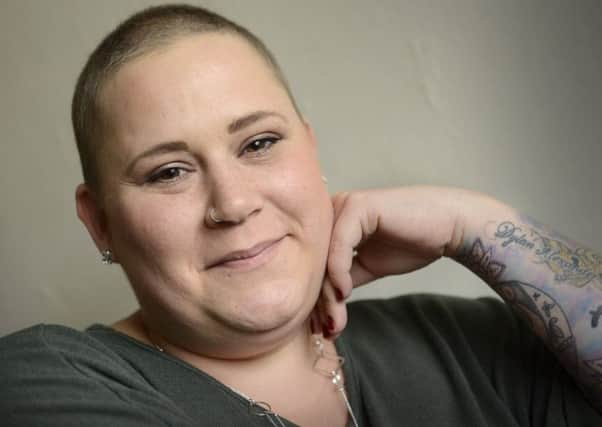Cancer survivor Laura wants to use '˜second chance' to raise awareness


Widdrington resident Laura Gibbon found out last month that she is cancer-free after undergoing surgeries and six rounds of chemotherapy to treat stage IIIc ovarian cancer.
The 30-year-old admits that she would never have expected a diagnosis of ovarian cancer – not least because it’s thought of as ‘an old woman’s disease’, but said: “If I had known the symptoms, something might have clicked.”
Advertisement
Hide AdAdvertisement
Hide AdThe rare form of the cancer that Laura had can be very chemo-resistant, which hasn’t seemed to be the case for the mum of two, but it does mean that there’s a 50 per cent chance of it returning.
“I did go through quite a dark patch in the middle and saw a psychiatrist a couple of times,” she said.
“I’m still terrified about it coming back, but if and when it does, I will be expecting it.
“I feel lucky now, I feel I have been given a second chance.
Advertisement
Hide AdAdvertisement
Hide Ad“That’s why I’m losing weight and trying to exercise more – it was a wake-up call.
“And because I’m better now, I feel it’s my duty to spread the word and tell people.”
This was something she started during her treatment, sharing a lengthy Facebook post every time she had a bout of chemo.
Laura, who is married to Andrew and mum to Dylan, six, and Amelia, four, says that the experience, which started last summer, has been ‘crazy and a bit overwhelming at times’, but the support from family and friends has been crucial.
Advertisement
Hide AdAdvertisement
Hide Ad“I don’t think I would be here if it wasn’t for the kids, knowing that you have to get up and look after them,” she said. “My husband’s been the main one looking after me.”
Her children have taken it all in their stride by and large, although the loss of Laura’s long, dark hair came as a shock and she wishes the pair were present when she shaved it off.
“They have both taken it really well, they have just taken it day to day. The weeks after chemo when I was very ill they have been great too and just left me to it.”
She is very grateful to her friend Holly Brewis, who secretly organised a party as well as a fund-raising campaign to send the family on a break at Haggerston Castle – “It was amazing, it was totally what we needed.”
Advertisement
Hide AdAdvertisement
Hide AdWhat’s more, another group of friends, led by Katie Blenkinsop, raised £1,000 after some of Laura and Andrew’s belongings were stolen.
She now also has a cancer-free party to look forward to, organised by her mum and younger sister, to mark the end of an ordeal which began last summer when she experienced pain in her pelvis.
The new hospital at Cramlington had just opened and the initial thoughts were that she had appendicitis. A scan revealed two large cysts on her ovaries, but these were thought to be benign and Laura was operated on to drain them.
When she returned for a scan three months later, the cysts had returned – but bigger. Following another operation to remove them, a biopsy revealed that the changes were borderline, or pre-cancerous.
Advertisement
Hide AdAdvertisement
Hide AdLaura was given the option of having her ovaries and Fallopian tubes removed or a full hysterectomy. Given the fact that her grandmother had died from breast cancer at the age of 53, she opted for the latter.
On February 29 this year, she went in for the operation, which was due to be a keyhole procedure, but woke to find a large scar running up to her ribs.
Another tumour had been discovered on her diaphragm and she had to undergo a process known as stripping.
Only then was the ovarian cancer diagnosed, leading to the six rounds of chemotherapy, which ended in August.
Advertisement
Hide AdAdvertisement
Hide Adl Symptoms to look out for: Persistent pelvic or abdominal pain; increased abdominal size/persistent bloating; difficulty eating or feeling full quickly; needing to wee more urgently or more often than usual.